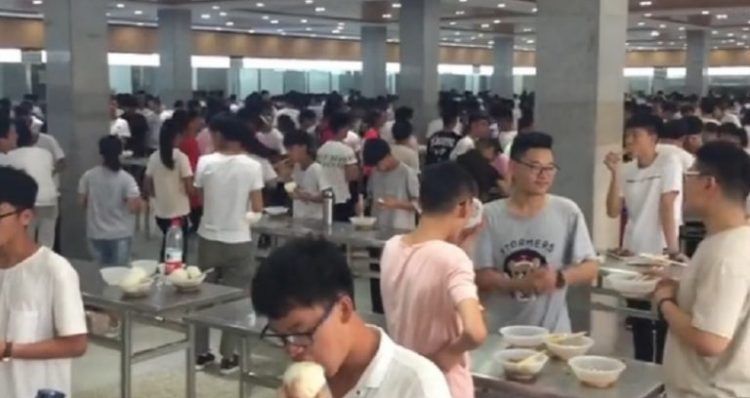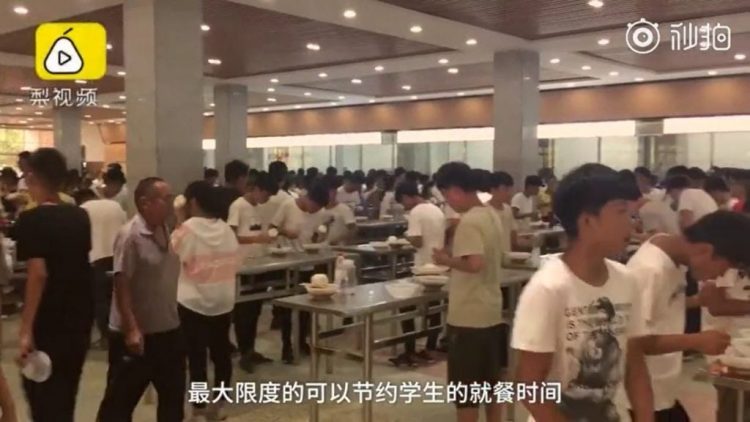A high-school in the Chinese city of Shangqiu, Henan Province, recently attracted criticism for removing cafeteria chairs to motivate student to eat faster and dedicate more time to their studies.
Students returning from their summer break were shocked to learn that they would have to start eating standing up after their school’s administrators decided to remove the chairs and benches to deter students from lingering around after finishing their meal. A spokesperson for the Shangqiu school told reporters that management also plans to implement assigned spots for each student to stand in, to further discourage them from wasting time instead of studying.

“Next, we’ll designate a lunch spot at the table for everyone to eat standing on their feet. On average, spending 10 minutes on lunch is enough,” a school employee says in a Pear video that recently went viral on Chinese social media.
The controversial move is believed to have been inspired by the draconian rules of “gaokao factories”, top Chinese high-schools infamous for using military-style disciplining techniques to prepare students for the Gaokao, China’s notoriously difficult college entrance exam. At some of these schools, classes start at 5:30 a.m. every day, and one of them even has two tanks installed at the entrance to motivate students.
Interestingly, a student from one of these gaokao factories commented that despite their grueling studying schedule, even they have cafeteria chairs.

The move has drawn a lot of criticism online, with many people arguing that it will not influence students’ performance at all, and might even lead to unhealthy eating habits.
“They’ll probably shut down the dining hall in the second term at this rate because according to their logic, it’ll really improve productivity if no one eats at all,” one person commented on Weibo, China’s version of Twitter.
“Don’t prisoners sit while they eat?” another person asked rhetorically.
This is only the latest in a series of bizarre techniques Chinese schools have been testing in order to improve their performance. Back in May, we wrote about a school in Hangzhou that implemented face-reading technology to make sure students are paying attention in class.
Latest Stories
-
Big Chef Season 4: Fish Challenge heats up as two contestants exit the competition
8 minutes -
‘Our interest is not to stay out of work; implement agreed conditions’ – Nurses
12 minutes -
I deeply regret getting involved in Ghana football – Dr. Kwame Kyei
23 minutes -
US Student Visa pause amid Social Media Vetting threatens Global Scholar Dreams
24 minutes -
A letter was sent to OSP over Ken Ofori-Atta’s inability to be in Ghana – Frank Davies
27 minutes -
Driven by vision: Inside Ghana’s first world-class automobile museum
29 minutes -
Labour export agreement will ensure legitimate jobs abroad to reduce unemployment – Pelpuo
31 minutes -
NDC urges re-run of Ablekuma North parliamentary election
32 minutes -
T-bills: Yields to decline further; Government got GH¢136.87bn in quarter one
32 minutes -
OMCs cut fuel prices; petrol going for GH¢11.77 per litre
41 minutes -
Johnnie Walker launches inaugural Ghana Golf Championship
46 minutes -
Rockson-Nelson Dafeamekpor: Democratisation of legal education in Ghana
1 hour -
China says US has ‘severely violated’ tariffs truce
1 hour -
Why is it difficult for people to understand that Ofori-Atta is sick? – Frank Davies asks
1 hour -
Select visionary achievers as chiefs – Daasebre Ayebiahwe urges traditional kingmakers
1 hour

